Leon Flagship's Singapore Expansion: PESTLE Analysis and Entry Modes
VerifiedAdded on 2022/08/23
|11
|3977
|22
Report
AI Summary
This report examines the potential for Leon Flagship, a UK-based fast-food restaurant, to expand into the Singapore market. It begins with an introduction to the Singapore food market, highlighting its cultural diversity and growth trends. A PESTLE analysis is conducted to evaluate the political, economic, social, technological, environmental, and legal factors influencing the business environment. The analysis considers factors such as government regulations, economic stability, changing consumer preferences, technological advancements, environmental concerns, and legal requirements. The report then explores two potential entry modes for Leon Flagship: licensing agreements and greenfield investments, with a recommendation for the most suitable mode based on the analysis. The report concludes with a summary of findings and recommendations, emphasizing the importance of adapting to the local market and adhering to relevant regulations for successful market entry.
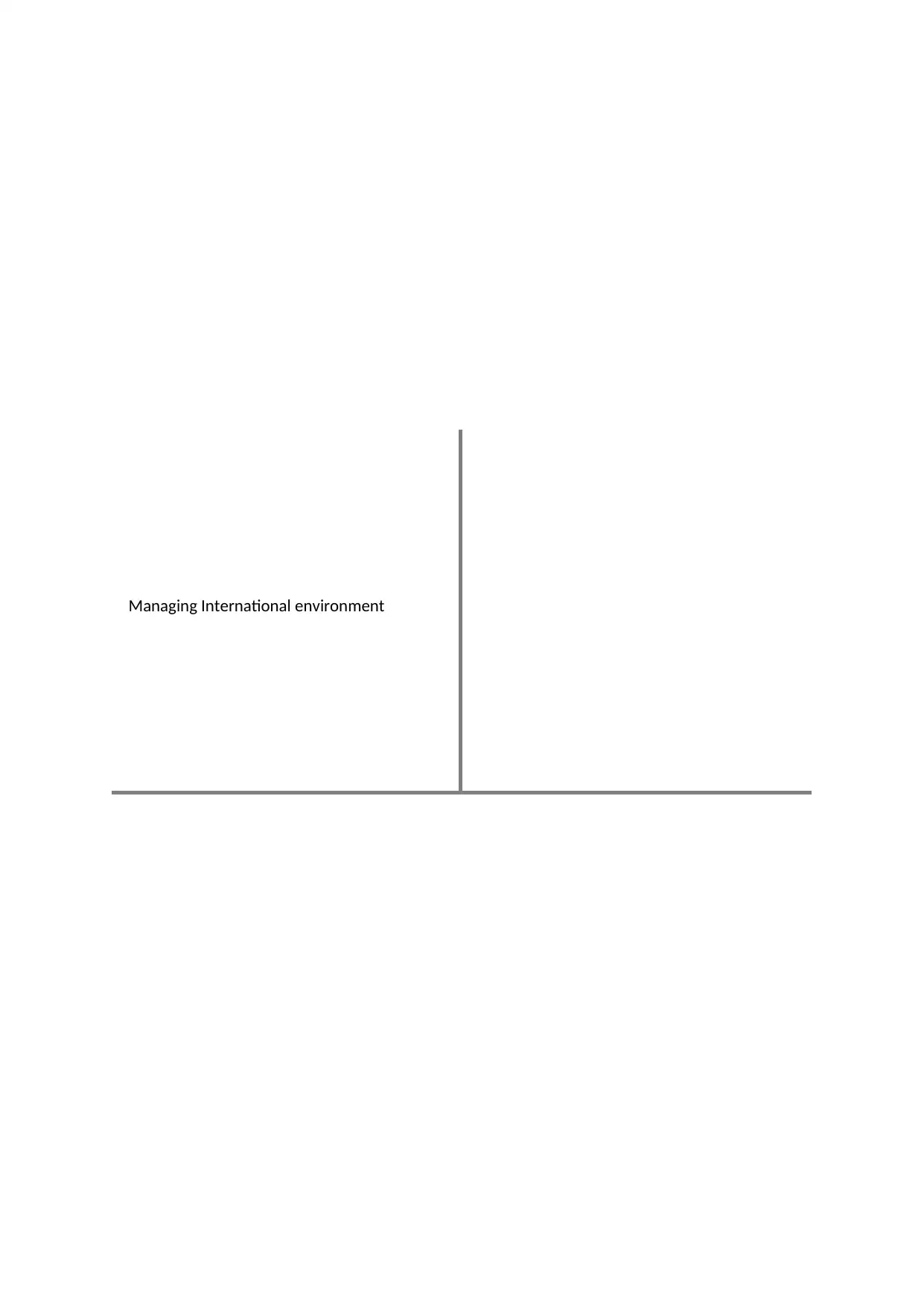
Managing International environment
Paraphrase This Document
Need a fresh take? Get an instant paraphrase of this document with our AI Paraphraser
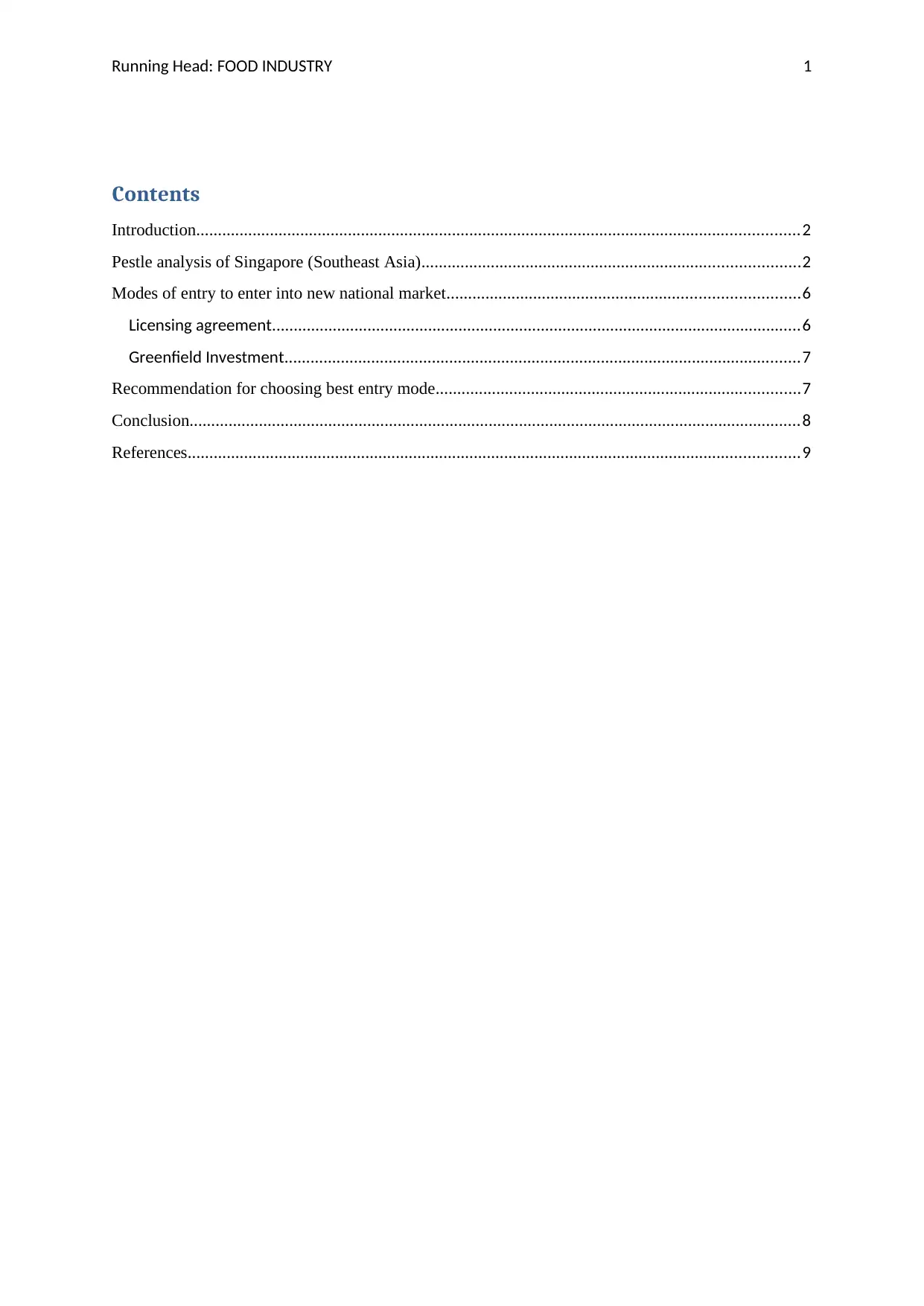
Running Head: FOOD INDUSTRY 1
Contents
Introduction...........................................................................................................................................2
Pestle analysis of Singapore (Southeast Asia).......................................................................................2
Modes of entry to enter into new national market.................................................................................6
Licensing agreement..........................................................................................................................6
Greenfield Investment.......................................................................................................................7
Recommendation for choosing best entry mode....................................................................................7
Conclusion.............................................................................................................................................8
References.............................................................................................................................................9
Contents
Introduction...........................................................................................................................................2
Pestle analysis of Singapore (Southeast Asia).......................................................................................2
Modes of entry to enter into new national market.................................................................................6
Licensing agreement..........................................................................................................................6
Greenfield Investment.......................................................................................................................7
Recommendation for choosing best entry mode....................................................................................7
Conclusion.............................................................................................................................................8
References.............................................................................................................................................9
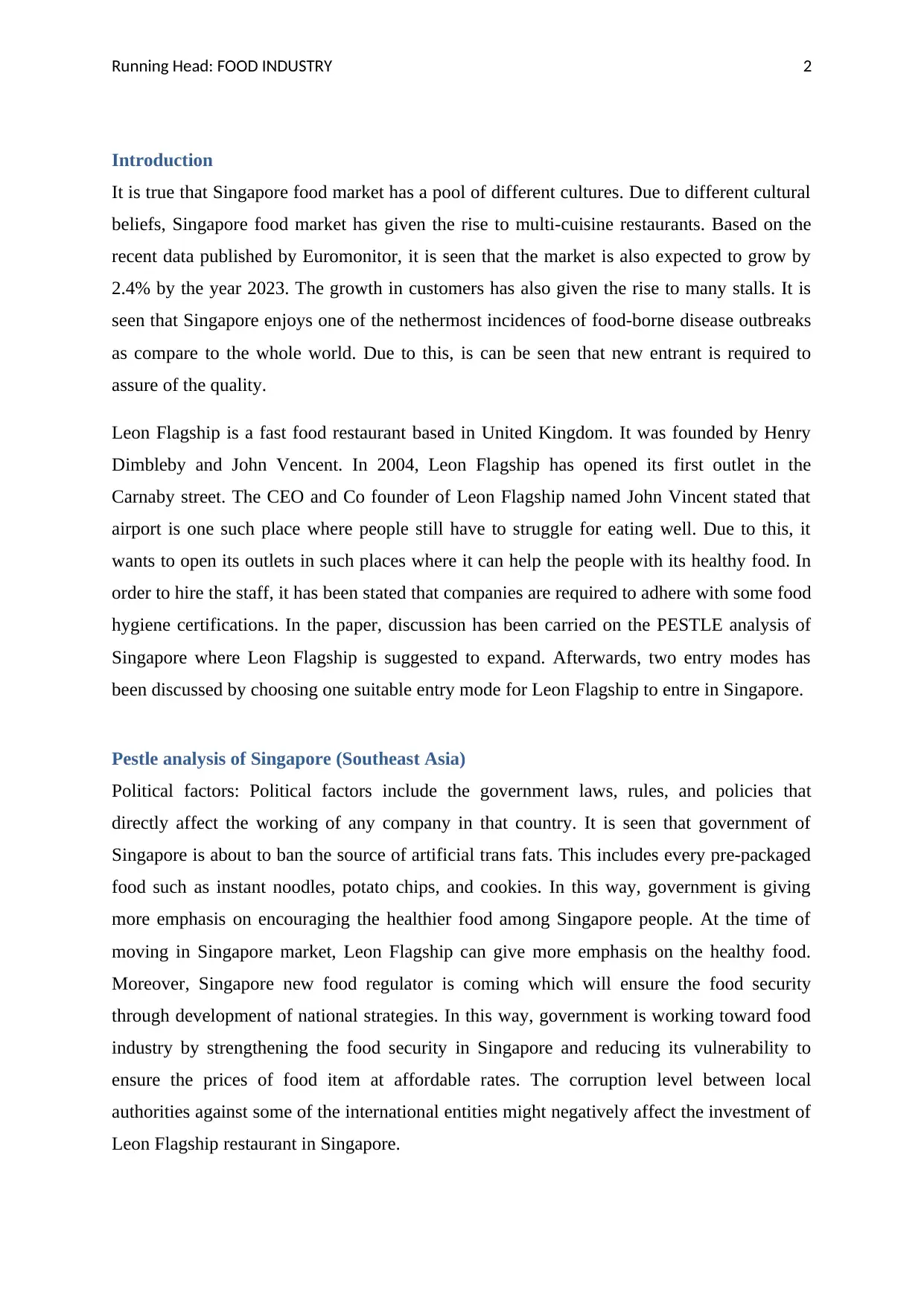
Running Head: FOOD INDUSTRY 2
Introduction
It is true that Singapore food market has a pool of different cultures. Due to different cultural
beliefs, Singapore food market has given the rise to multi-cuisine restaurants. Based on the
recent data published by Euromonitor, it is seen that the market is also expected to grow by
2.4% by the year 2023. The growth in customers has also given the rise to many stalls. It is
seen that Singapore enjoys one of the nethermost incidences of food-borne disease outbreaks
as compare to the whole world. Due to this, is can be seen that new entrant is required to
assure of the quality.
Leon Flagship is a fast food restaurant based in United Kingdom. It was founded by Henry
Dimbleby and John Vencent. In 2004, Leon Flagship has opened its first outlet in the
Carnaby street. The CEO and Co founder of Leon Flagship named John Vincent stated that
airport is one such place where people still have to struggle for eating well. Due to this, it
wants to open its outlets in such places where it can help the people with its healthy food. In
order to hire the staff, it has been stated that companies are required to adhere with some food
hygiene certifications. In the paper, discussion has been carried on the PESTLE analysis of
Singapore where Leon Flagship is suggested to expand. Afterwards, two entry modes has
been discussed by choosing one suitable entry mode for Leon Flagship to entre in Singapore.
Pestle analysis of Singapore (Southeast Asia)
Political factors: Political factors include the government laws, rules, and policies that
directly affect the working of any company in that country. It is seen that government of
Singapore is about to ban the source of artificial trans fats. This includes every pre-packaged
food such as instant noodles, potato chips, and cookies. In this way, government is giving
more emphasis on encouraging the healthier food among Singapore people. At the time of
moving in Singapore market, Leon Flagship can give more emphasis on the healthy food.
Moreover, Singapore new food regulator is coming which will ensure the food security
through development of national strategies. In this way, government is working toward food
industry by strengthening the food security in Singapore and reducing its vulnerability to
ensure the prices of food item at affordable rates. The corruption level between local
authorities against some of the international entities might negatively affect the investment of
Leon Flagship restaurant in Singapore.
Introduction
It is true that Singapore food market has a pool of different cultures. Due to different cultural
beliefs, Singapore food market has given the rise to multi-cuisine restaurants. Based on the
recent data published by Euromonitor, it is seen that the market is also expected to grow by
2.4% by the year 2023. The growth in customers has also given the rise to many stalls. It is
seen that Singapore enjoys one of the nethermost incidences of food-borne disease outbreaks
as compare to the whole world. Due to this, is can be seen that new entrant is required to
assure of the quality.
Leon Flagship is a fast food restaurant based in United Kingdom. It was founded by Henry
Dimbleby and John Vencent. In 2004, Leon Flagship has opened its first outlet in the
Carnaby street. The CEO and Co founder of Leon Flagship named John Vincent stated that
airport is one such place where people still have to struggle for eating well. Due to this, it
wants to open its outlets in such places where it can help the people with its healthy food. In
order to hire the staff, it has been stated that companies are required to adhere with some food
hygiene certifications. In the paper, discussion has been carried on the PESTLE analysis of
Singapore where Leon Flagship is suggested to expand. Afterwards, two entry modes has
been discussed by choosing one suitable entry mode for Leon Flagship to entre in Singapore.
Pestle analysis of Singapore (Southeast Asia)
Political factors: Political factors include the government laws, rules, and policies that
directly affect the working of any company in that country. It is seen that government of
Singapore is about to ban the source of artificial trans fats. This includes every pre-packaged
food such as instant noodles, potato chips, and cookies. In this way, government is giving
more emphasis on encouraging the healthier food among Singapore people. At the time of
moving in Singapore market, Leon Flagship can give more emphasis on the healthy food.
Moreover, Singapore new food regulator is coming which will ensure the food security
through development of national strategies. In this way, government is working toward food
industry by strengthening the food security in Singapore and reducing its vulnerability to
ensure the prices of food item at affordable rates. The corruption level between local
authorities against some of the international entities might negatively affect the investment of
Leon Flagship restaurant in Singapore.
⊘ This is a preview!⊘
Do you want full access?
Subscribe today to unlock all pages.

Trusted by 1+ million students worldwide
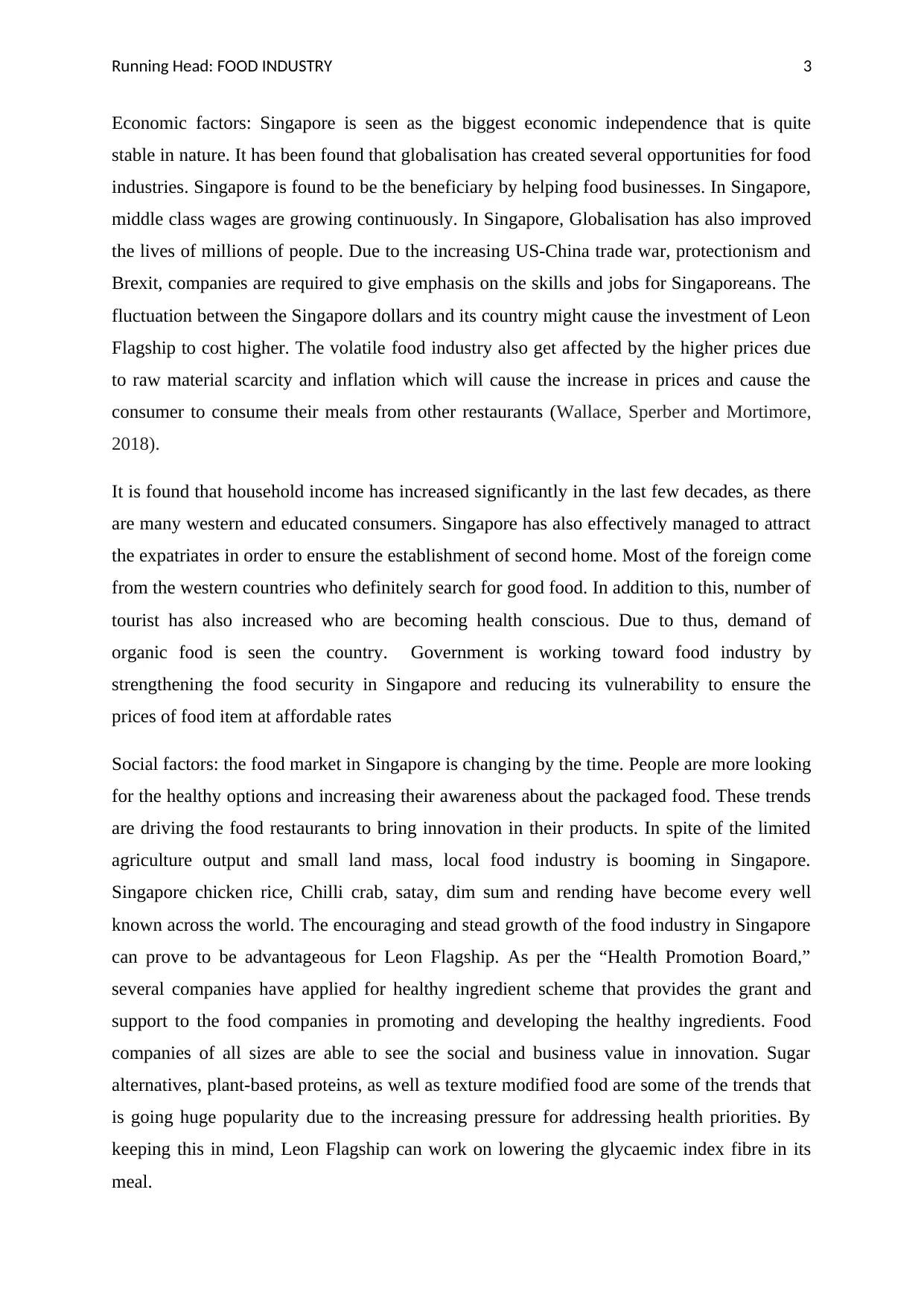
Running Head: FOOD INDUSTRY 3
Economic factors: Singapore is seen as the biggest economic independence that is quite
stable in nature. It has been found that globalisation has created several opportunities for food
industries. Singapore is found to be the beneficiary by helping food businesses. In Singapore,
middle class wages are growing continuously. In Singapore, Globalisation has also improved
the lives of millions of people. Due to the increasing US-China trade war, protectionism and
Brexit, companies are required to give emphasis on the skills and jobs for Singaporeans. The
fluctuation between the Singapore dollars and its country might cause the investment of Leon
Flagship to cost higher. The volatile food industry also get affected by the higher prices due
to raw material scarcity and inflation which will cause the increase in prices and cause the
consumer to consume their meals from other restaurants (Wallace, Sperber and Mortimore,
2018).
It is found that household income has increased significantly in the last few decades, as there
are many western and educated consumers. Singapore has also effectively managed to attract
the expatriates in order to ensure the establishment of second home. Most of the foreign come
from the western countries who definitely search for good food. In addition to this, number of
tourist has also increased who are becoming health conscious. Due to thus, demand of
organic food is seen the country. Government is working toward food industry by
strengthening the food security in Singapore and reducing its vulnerability to ensure the
prices of food item at affordable rates
Social factors: the food market in Singapore is changing by the time. People are more looking
for the healthy options and increasing their awareness about the packaged food. These trends
are driving the food restaurants to bring innovation in their products. In spite of the limited
agriculture output and small land mass, local food industry is booming in Singapore.
Singapore chicken rice, Chilli crab, satay, dim sum and rending have become every well
known across the world. The encouraging and stead growth of the food industry in Singapore
can prove to be advantageous for Leon Flagship. As per the “Health Promotion Board,”
several companies have applied for healthy ingredient scheme that provides the grant and
support to the food companies in promoting and developing the healthy ingredients. Food
companies of all sizes are able to see the social and business value in innovation. Sugar
alternatives, plant-based proteins, as well as texture modified food are some of the trends that
is going huge popularity due to the increasing pressure for addressing health priorities. By
keeping this in mind, Leon Flagship can work on lowering the glycaemic index fibre in its
meal.
Economic factors: Singapore is seen as the biggest economic independence that is quite
stable in nature. It has been found that globalisation has created several opportunities for food
industries. Singapore is found to be the beneficiary by helping food businesses. In Singapore,
middle class wages are growing continuously. In Singapore, Globalisation has also improved
the lives of millions of people. Due to the increasing US-China trade war, protectionism and
Brexit, companies are required to give emphasis on the skills and jobs for Singaporeans. The
fluctuation between the Singapore dollars and its country might cause the investment of Leon
Flagship to cost higher. The volatile food industry also get affected by the higher prices due
to raw material scarcity and inflation which will cause the increase in prices and cause the
consumer to consume their meals from other restaurants (Wallace, Sperber and Mortimore,
2018).
It is found that household income has increased significantly in the last few decades, as there
are many western and educated consumers. Singapore has also effectively managed to attract
the expatriates in order to ensure the establishment of second home. Most of the foreign come
from the western countries who definitely search for good food. In addition to this, number of
tourist has also increased who are becoming health conscious. Due to thus, demand of
organic food is seen the country. Government is working toward food industry by
strengthening the food security in Singapore and reducing its vulnerability to ensure the
prices of food item at affordable rates
Social factors: the food market in Singapore is changing by the time. People are more looking
for the healthy options and increasing their awareness about the packaged food. These trends
are driving the food restaurants to bring innovation in their products. In spite of the limited
agriculture output and small land mass, local food industry is booming in Singapore.
Singapore chicken rice, Chilli crab, satay, dim sum and rending have become every well
known across the world. The encouraging and stead growth of the food industry in Singapore
can prove to be advantageous for Leon Flagship. As per the “Health Promotion Board,”
several companies have applied for healthy ingredient scheme that provides the grant and
support to the food companies in promoting and developing the healthy ingredients. Food
companies of all sizes are able to see the social and business value in innovation. Sugar
alternatives, plant-based proteins, as well as texture modified food are some of the trends that
is going huge popularity due to the increasing pressure for addressing health priorities. By
keeping this in mind, Leon Flagship can work on lowering the glycaemic index fibre in its
meal.
Paraphrase This Document
Need a fresh take? Get an instant paraphrase of this document with our AI Paraphraser
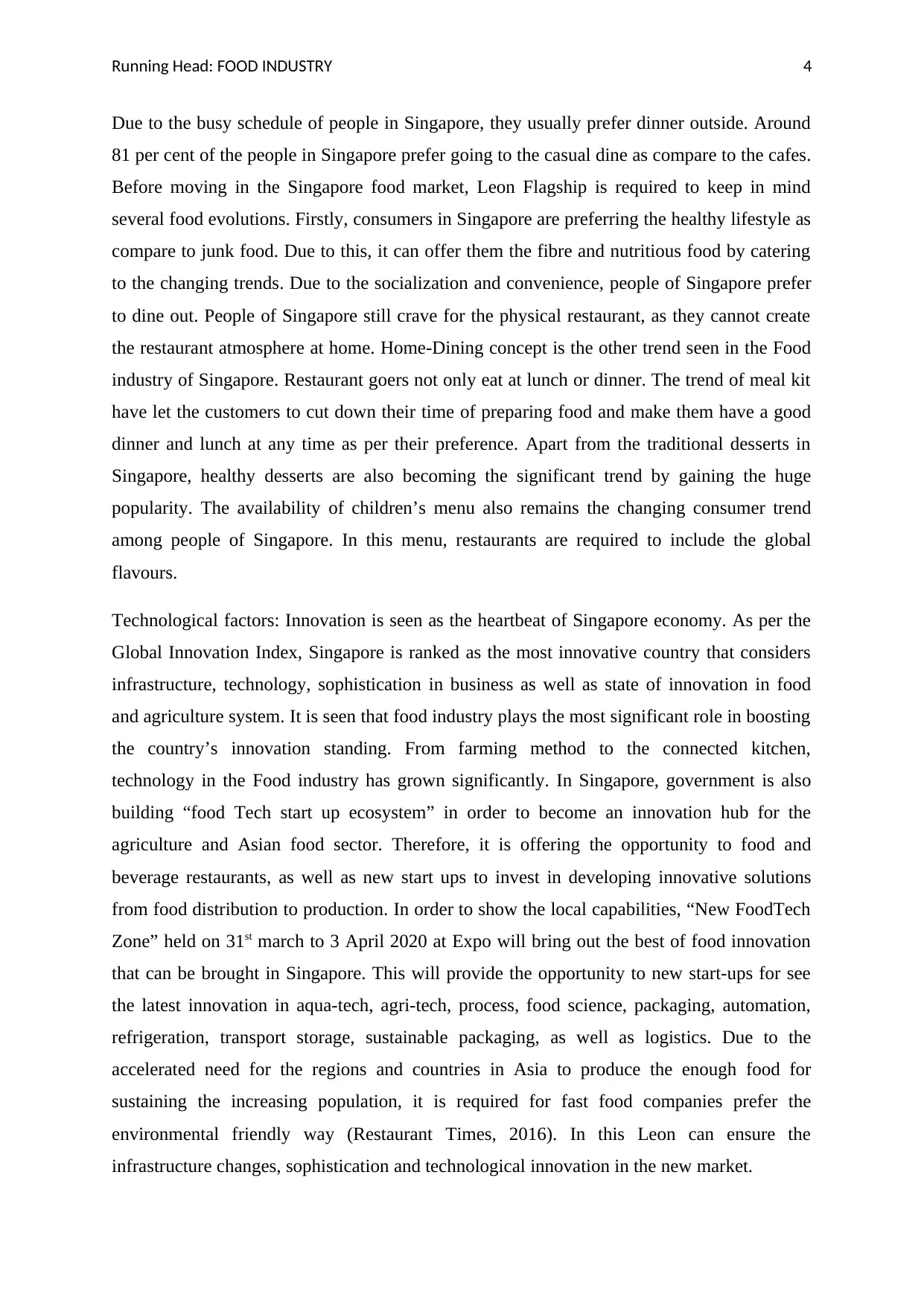
Running Head: FOOD INDUSTRY 4
Due to the busy schedule of people in Singapore, they usually prefer dinner outside. Around
81 per cent of the people in Singapore prefer going to the casual dine as compare to the cafes.
Before moving in the Singapore food market, Leon Flagship is required to keep in mind
several food evolutions. Firstly, consumers in Singapore are preferring the healthy lifestyle as
compare to junk food. Due to this, it can offer them the fibre and nutritious food by catering
to the changing trends. Due to the socialization and convenience, people of Singapore prefer
to dine out. People of Singapore still crave for the physical restaurant, as they cannot create
the restaurant atmosphere at home. Home-Dining concept is the other trend seen in the Food
industry of Singapore. Restaurant goers not only eat at lunch or dinner. The trend of meal kit
have let the customers to cut down their time of preparing food and make them have a good
dinner and lunch at any time as per their preference. Apart from the traditional desserts in
Singapore, healthy desserts are also becoming the significant trend by gaining the huge
popularity. The availability of children’s menu also remains the changing consumer trend
among people of Singapore. In this menu, restaurants are required to include the global
flavours.
Technological factors: Innovation is seen as the heartbeat of Singapore economy. As per the
Global Innovation Index, Singapore is ranked as the most innovative country that considers
infrastructure, technology, sophistication in business as well as state of innovation in food
and agriculture system. It is seen that food industry plays the most significant role in boosting
the country’s innovation standing. From farming method to the connected kitchen,
technology in the Food industry has grown significantly. In Singapore, government is also
building “food Tech start up ecosystem” in order to become an innovation hub for the
agriculture and Asian food sector. Therefore, it is offering the opportunity to food and
beverage restaurants, as well as new start ups to invest in developing innovative solutions
from food distribution to production. In order to show the local capabilities, “New FoodTech
Zone” held on 31st march to 3 April 2020 at Expo will bring out the best of food innovation
that can be brought in Singapore. This will provide the opportunity to new start-ups for see
the latest innovation in aqua-tech, agri-tech, process, food science, packaging, automation,
refrigeration, transport storage, sustainable packaging, as well as logistics. Due to the
accelerated need for the regions and countries in Asia to produce the enough food for
sustaining the increasing population, it is required for fast food companies prefer the
environmental friendly way (Restaurant Times, 2016). In this Leon can ensure the
infrastructure changes, sophistication and technological innovation in the new market.
Due to the busy schedule of people in Singapore, they usually prefer dinner outside. Around
81 per cent of the people in Singapore prefer going to the casual dine as compare to the cafes.
Before moving in the Singapore food market, Leon Flagship is required to keep in mind
several food evolutions. Firstly, consumers in Singapore are preferring the healthy lifestyle as
compare to junk food. Due to this, it can offer them the fibre and nutritious food by catering
to the changing trends. Due to the socialization and convenience, people of Singapore prefer
to dine out. People of Singapore still crave for the physical restaurant, as they cannot create
the restaurant atmosphere at home. Home-Dining concept is the other trend seen in the Food
industry of Singapore. Restaurant goers not only eat at lunch or dinner. The trend of meal kit
have let the customers to cut down their time of preparing food and make them have a good
dinner and lunch at any time as per their preference. Apart from the traditional desserts in
Singapore, healthy desserts are also becoming the significant trend by gaining the huge
popularity. The availability of children’s menu also remains the changing consumer trend
among people of Singapore. In this menu, restaurants are required to include the global
flavours.
Technological factors: Innovation is seen as the heartbeat of Singapore economy. As per the
Global Innovation Index, Singapore is ranked as the most innovative country that considers
infrastructure, technology, sophistication in business as well as state of innovation in food
and agriculture system. It is seen that food industry plays the most significant role in boosting
the country’s innovation standing. From farming method to the connected kitchen,
technology in the Food industry has grown significantly. In Singapore, government is also
building “food Tech start up ecosystem” in order to become an innovation hub for the
agriculture and Asian food sector. Therefore, it is offering the opportunity to food and
beverage restaurants, as well as new start ups to invest in developing innovative solutions
from food distribution to production. In order to show the local capabilities, “New FoodTech
Zone” held on 31st march to 3 April 2020 at Expo will bring out the best of food innovation
that can be brought in Singapore. This will provide the opportunity to new start-ups for see
the latest innovation in aqua-tech, agri-tech, process, food science, packaging, automation,
refrigeration, transport storage, sustainable packaging, as well as logistics. Due to the
accelerated need for the regions and countries in Asia to produce the enough food for
sustaining the increasing population, it is required for fast food companies prefer the
environmental friendly way (Restaurant Times, 2016). In this Leon can ensure the
infrastructure changes, sophistication and technological innovation in the new market.
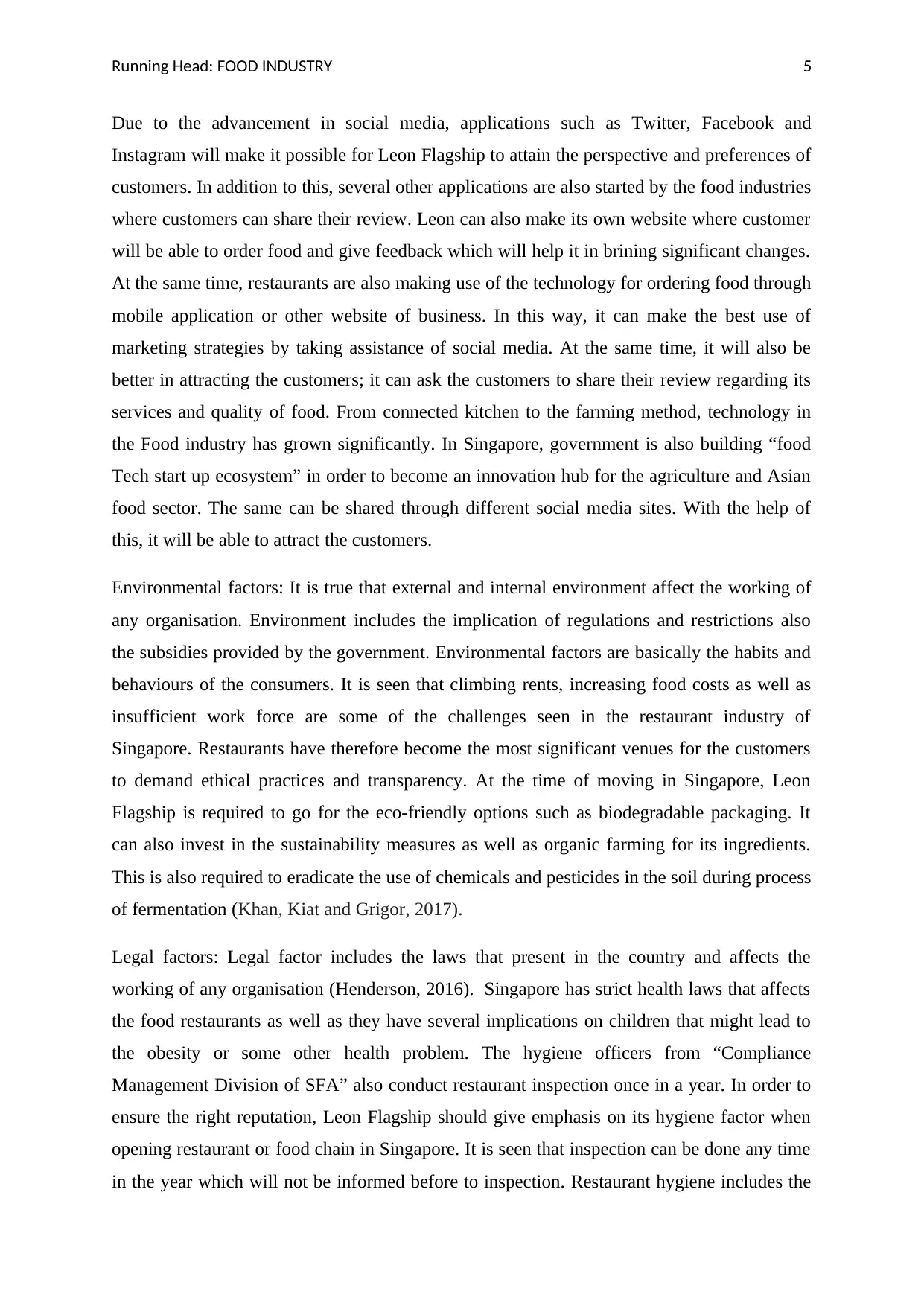
Running Head: FOOD INDUSTRY 5
Due to the advancement in social media, applications such as Twitter, Facebook and
Instagram will make it possible for Leon Flagship to attain the perspective and preferences of
customers. In addition to this, several other applications are also started by the food industries
where customers can share their review. Leon can also make its own website where customer
will be able to order food and give feedback which will help it in brining significant changes.
At the same time, restaurants are also making use of the technology for ordering food through
mobile application or other website of business. In this way, it can make the best use of
marketing strategies by taking assistance of social media. At the same time, it will also be
better in attracting the customers; it can ask the customers to share their review regarding its
services and quality of food. From connected kitchen to the farming method, technology in
the Food industry has grown significantly. In Singapore, government is also building “food
Tech start up ecosystem” in order to become an innovation hub for the agriculture and Asian
food sector. The same can be shared through different social media sites. With the help of
this, it will be able to attract the customers.
Environmental factors: It is true that external and internal environment affect the working of
any organisation. Environment includes the implication of regulations and restrictions also
the subsidies provided by the government. Environmental factors are basically the habits and
behaviours of the consumers. It is seen that climbing rents, increasing food costs as well as
insufficient work force are some of the challenges seen in the restaurant industry of
Singapore. Restaurants have therefore become the most significant venues for the customers
to demand ethical practices and transparency. At the time of moving in Singapore, Leon
Flagship is required to go for the eco-friendly options such as biodegradable packaging. It
can also invest in the sustainability measures as well as organic farming for its ingredients.
This is also required to eradicate the use of chemicals and pesticides in the soil during process
of fermentation (Khan, Kiat and Grigor, 2017).
Legal factors: Legal factor includes the laws that present in the country and affects the
working of any organisation (Henderson, 2016). Singapore has strict health laws that affects
the food restaurants as well as they have several implications on children that might lead to
the obesity or some other health problem. The hygiene officers from “Compliance
Management Division of SFA” also conduct restaurant inspection once in a year. In order to
ensure the right reputation, Leon Flagship should give emphasis on its hygiene factor when
opening restaurant or food chain in Singapore. It is seen that inspection can be done any time
in the year which will not be informed before to inspection. Restaurant hygiene includes the
Due to the advancement in social media, applications such as Twitter, Facebook and
Instagram will make it possible for Leon Flagship to attain the perspective and preferences of
customers. In addition to this, several other applications are also started by the food industries
where customers can share their review. Leon can also make its own website where customer
will be able to order food and give feedback which will help it in brining significant changes.
At the same time, restaurants are also making use of the technology for ordering food through
mobile application or other website of business. In this way, it can make the best use of
marketing strategies by taking assistance of social media. At the same time, it will also be
better in attracting the customers; it can ask the customers to share their review regarding its
services and quality of food. From connected kitchen to the farming method, technology in
the Food industry has grown significantly. In Singapore, government is also building “food
Tech start up ecosystem” in order to become an innovation hub for the agriculture and Asian
food sector. The same can be shared through different social media sites. With the help of
this, it will be able to attract the customers.
Environmental factors: It is true that external and internal environment affect the working of
any organisation. Environment includes the implication of regulations and restrictions also
the subsidies provided by the government. Environmental factors are basically the habits and
behaviours of the consumers. It is seen that climbing rents, increasing food costs as well as
insufficient work force are some of the challenges seen in the restaurant industry of
Singapore. Restaurants have therefore become the most significant venues for the customers
to demand ethical practices and transparency. At the time of moving in Singapore, Leon
Flagship is required to go for the eco-friendly options such as biodegradable packaging. It
can also invest in the sustainability measures as well as organic farming for its ingredients.
This is also required to eradicate the use of chemicals and pesticides in the soil during process
of fermentation (Khan, Kiat and Grigor, 2017).
Legal factors: Legal factor includes the laws that present in the country and affects the
working of any organisation (Henderson, 2016). Singapore has strict health laws that affects
the food restaurants as well as they have several implications on children that might lead to
the obesity or some other health problem. The hygiene officers from “Compliance
Management Division of SFA” also conduct restaurant inspection once in a year. In order to
ensure the right reputation, Leon Flagship should give emphasis on its hygiene factor when
opening restaurant or food chain in Singapore. It is seen that inspection can be done any time
in the year which will not be informed before to inspection. Restaurant hygiene includes the
⊘ This is a preview!⊘
Do you want full access?
Subscribe today to unlock all pages.

Trusted by 1+ million students worldwide
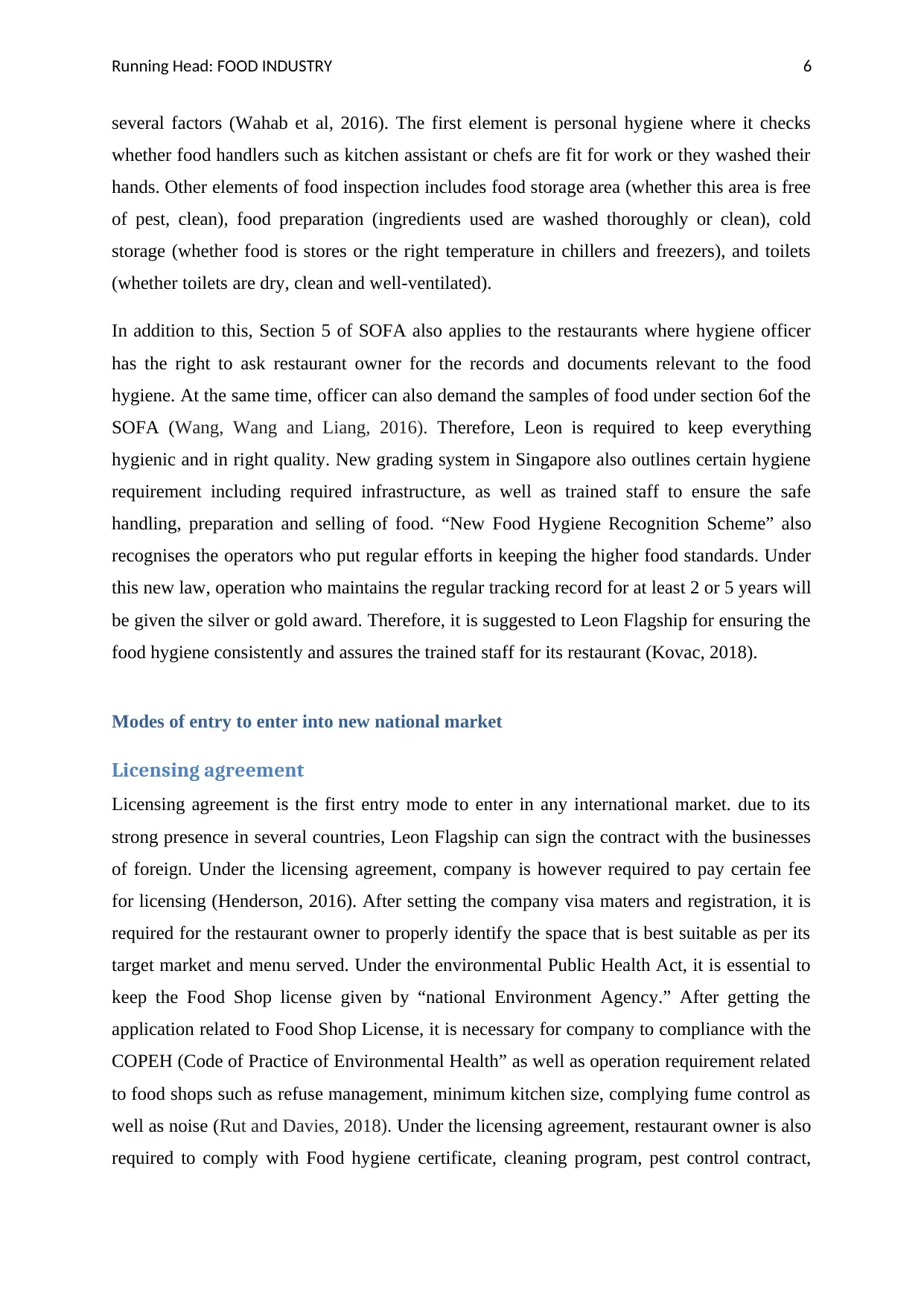
Running Head: FOOD INDUSTRY 6
several factors (Wahab et al, 2016). The first element is personal hygiene where it checks
whether food handlers such as kitchen assistant or chefs are fit for work or they washed their
hands. Other elements of food inspection includes food storage area (whether this area is free
of pest, clean), food preparation (ingredients used are washed thoroughly or clean), cold
storage (whether food is stores or the right temperature in chillers and freezers), and toilets
(whether toilets are dry, clean and well-ventilated).
In addition to this, Section 5 of SOFA also applies to the restaurants where hygiene officer
has the right to ask restaurant owner for the records and documents relevant to the food
hygiene. At the same time, officer can also demand the samples of food under section 6of the
SOFA (Wang, Wang and Liang, 2016). Therefore, Leon is required to keep everything
hygienic and in right quality. New grading system in Singapore also outlines certain hygiene
requirement including required infrastructure, as well as trained staff to ensure the safe
handling, preparation and selling of food. “New Food Hygiene Recognition Scheme” also
recognises the operators who put regular efforts in keeping the higher food standards. Under
this new law, operation who maintains the regular tracking record for at least 2 or 5 years will
be given the silver or gold award. Therefore, it is suggested to Leon Flagship for ensuring the
food hygiene consistently and assures the trained staff for its restaurant (Kovac, 2018).
Modes of entry to enter into new national market
Licensing agreement
Licensing agreement is the first entry mode to enter in any international market. due to its
strong presence in several countries, Leon Flagship can sign the contract with the businesses
of foreign. Under the licensing agreement, company is however required to pay certain fee
for licensing (Henderson, 2016). After setting the company visa maters and registration, it is
required for the restaurant owner to properly identify the space that is best suitable as per its
target market and menu served. Under the environmental Public Health Act, it is essential to
keep the Food Shop license given by “national Environment Agency.” After getting the
application related to Food Shop License, it is necessary for company to compliance with the
COPEH (Code of Practice of Environmental Health” as well as operation requirement related
to food shops such as refuse management, minimum kitchen size, complying fume control as
well as noise (Rut and Davies, 2018). Under the licensing agreement, restaurant owner is also
required to comply with Food hygiene certificate, cleaning program, pest control contract,
several factors (Wahab et al, 2016). The first element is personal hygiene where it checks
whether food handlers such as kitchen assistant or chefs are fit for work or they washed their
hands. Other elements of food inspection includes food storage area (whether this area is free
of pest, clean), food preparation (ingredients used are washed thoroughly or clean), cold
storage (whether food is stores or the right temperature in chillers and freezers), and toilets
(whether toilets are dry, clean and well-ventilated).
In addition to this, Section 5 of SOFA also applies to the restaurants where hygiene officer
has the right to ask restaurant owner for the records and documents relevant to the food
hygiene. At the same time, officer can also demand the samples of food under section 6of the
SOFA (Wang, Wang and Liang, 2016). Therefore, Leon is required to keep everything
hygienic and in right quality. New grading system in Singapore also outlines certain hygiene
requirement including required infrastructure, as well as trained staff to ensure the safe
handling, preparation and selling of food. “New Food Hygiene Recognition Scheme” also
recognises the operators who put regular efforts in keeping the higher food standards. Under
this new law, operation who maintains the regular tracking record for at least 2 or 5 years will
be given the silver or gold award. Therefore, it is suggested to Leon Flagship for ensuring the
food hygiene consistently and assures the trained staff for its restaurant (Kovac, 2018).
Modes of entry to enter into new national market
Licensing agreement
Licensing agreement is the first entry mode to enter in any international market. due to its
strong presence in several countries, Leon Flagship can sign the contract with the businesses
of foreign. Under the licensing agreement, company is however required to pay certain fee
for licensing (Henderson, 2016). After setting the company visa maters and registration, it is
required for the restaurant owner to properly identify the space that is best suitable as per its
target market and menu served. Under the environmental Public Health Act, it is essential to
keep the Food Shop license given by “national Environment Agency.” After getting the
application related to Food Shop License, it is necessary for company to compliance with the
COPEH (Code of Practice of Environmental Health” as well as operation requirement related
to food shops such as refuse management, minimum kitchen size, complying fume control as
well as noise (Rut and Davies, 2018). Under the licensing agreement, restaurant owner is also
required to comply with Food hygiene certificate, cleaning program, pest control contract,
Paraphrase This Document
Need a fresh take? Get an instant paraphrase of this document with our AI Paraphraser
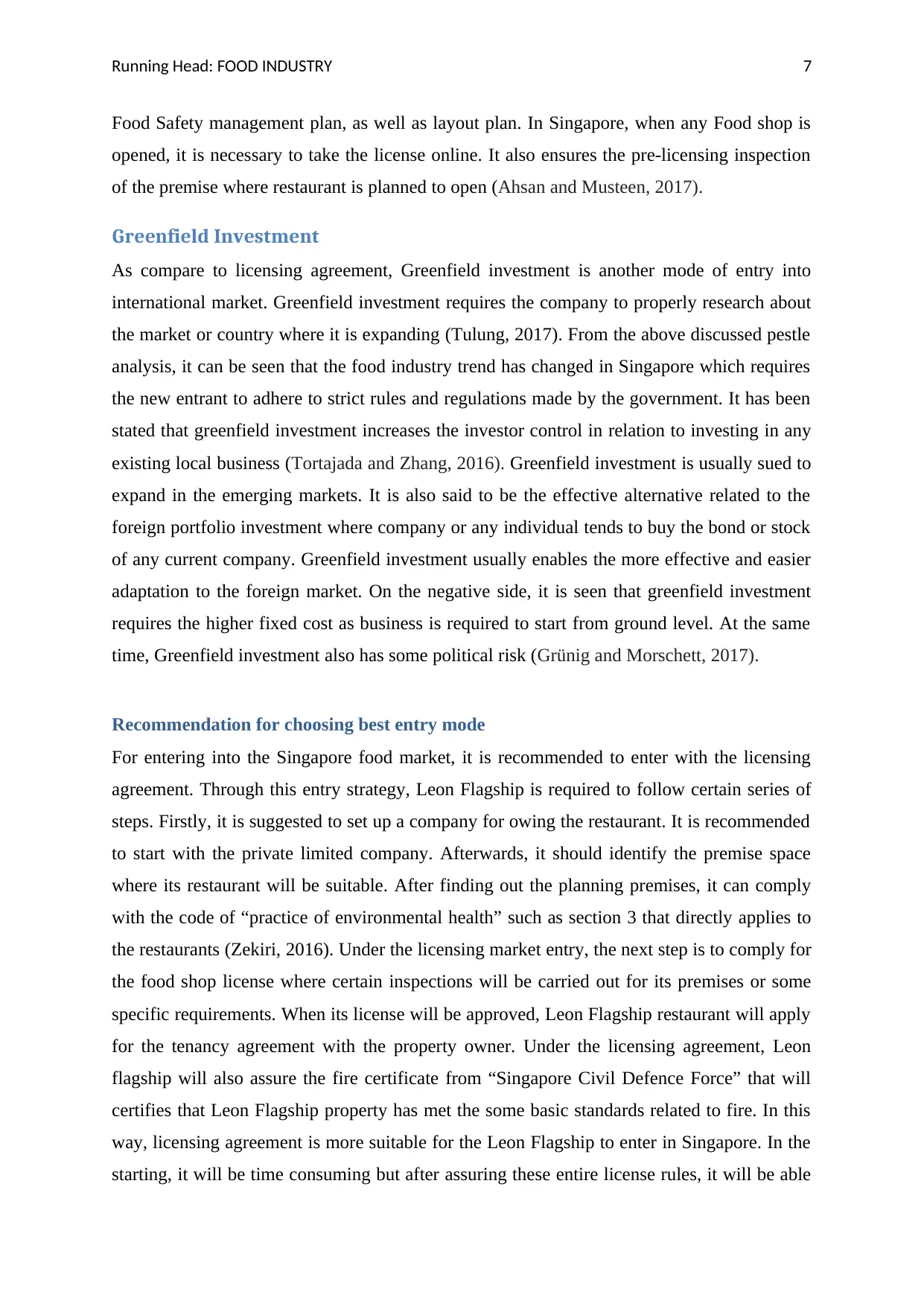
Running Head: FOOD INDUSTRY 7
Food Safety management plan, as well as layout plan. In Singapore, when any Food shop is
opened, it is necessary to take the license online. It also ensures the pre-licensing inspection
of the premise where restaurant is planned to open (Ahsan and Musteen, 2017).
Greenfield Investment
As compare to licensing agreement, Greenfield investment is another mode of entry into
international market. Greenfield investment requires the company to properly research about
the market or country where it is expanding (Tulung, 2017). From the above discussed pestle
analysis, it can be seen that the food industry trend has changed in Singapore which requires
the new entrant to adhere to strict rules and regulations made by the government. It has been
stated that greenfield investment increases the investor control in relation to investing in any
existing local business (Tortajada and Zhang, 2016). Greenfield investment is usually sued to
expand in the emerging markets. It is also said to be the effective alternative related to the
foreign portfolio investment where company or any individual tends to buy the bond or stock
of any current company. Greenfield investment usually enables the more effective and easier
adaptation to the foreign market. On the negative side, it is seen that greenfield investment
requires the higher fixed cost as business is required to start from ground level. At the same
time, Greenfield investment also has some political risk (Grünig and Morschett, 2017).
Recommendation for choosing best entry mode
For entering into the Singapore food market, it is recommended to enter with the licensing
agreement. Through this entry strategy, Leon Flagship is required to follow certain series of
steps. Firstly, it is suggested to set up a company for owing the restaurant. It is recommended
to start with the private limited company. Afterwards, it should identify the premise space
where its restaurant will be suitable. After finding out the planning premises, it can comply
with the code of “practice of environmental health” such as section 3 that directly applies to
the restaurants (Zekiri, 2016). Under the licensing market entry, the next step is to comply for
the food shop license where certain inspections will be carried out for its premises or some
specific requirements. When its license will be approved, Leon Flagship restaurant will apply
for the tenancy agreement with the property owner. Under the licensing agreement, Leon
flagship will also assure the fire certificate from “Singapore Civil Defence Force” that will
certifies that Leon Flagship property has met the some basic standards related to fire. In this
way, licensing agreement is more suitable for the Leon Flagship to enter in Singapore. In the
starting, it will be time consuming but after assuring these entire license rules, it will be able
Food Safety management plan, as well as layout plan. In Singapore, when any Food shop is
opened, it is necessary to take the license online. It also ensures the pre-licensing inspection
of the premise where restaurant is planned to open (Ahsan and Musteen, 2017).
Greenfield Investment
As compare to licensing agreement, Greenfield investment is another mode of entry into
international market. Greenfield investment requires the company to properly research about
the market or country where it is expanding (Tulung, 2017). From the above discussed pestle
analysis, it can be seen that the food industry trend has changed in Singapore which requires
the new entrant to adhere to strict rules and regulations made by the government. It has been
stated that greenfield investment increases the investor control in relation to investing in any
existing local business (Tortajada and Zhang, 2016). Greenfield investment is usually sued to
expand in the emerging markets. It is also said to be the effective alternative related to the
foreign portfolio investment where company or any individual tends to buy the bond or stock
of any current company. Greenfield investment usually enables the more effective and easier
adaptation to the foreign market. On the negative side, it is seen that greenfield investment
requires the higher fixed cost as business is required to start from ground level. At the same
time, Greenfield investment also has some political risk (Grünig and Morschett, 2017).
Recommendation for choosing best entry mode
For entering into the Singapore food market, it is recommended to enter with the licensing
agreement. Through this entry strategy, Leon Flagship is required to follow certain series of
steps. Firstly, it is suggested to set up a company for owing the restaurant. It is recommended
to start with the private limited company. Afterwards, it should identify the premise space
where its restaurant will be suitable. After finding out the planning premises, it can comply
with the code of “practice of environmental health” such as section 3 that directly applies to
the restaurants (Zekiri, 2016). Under the licensing market entry, the next step is to comply for
the food shop license where certain inspections will be carried out for its premises or some
specific requirements. When its license will be approved, Leon Flagship restaurant will apply
for the tenancy agreement with the property owner. Under the licensing agreement, Leon
flagship will also assure the fire certificate from “Singapore Civil Defence Force” that will
certifies that Leon Flagship property has met the some basic standards related to fire. In this
way, licensing agreement is more suitable for the Leon Flagship to enter in Singapore. In the
starting, it will be time consuming but after assuring these entire license rules, it will be able
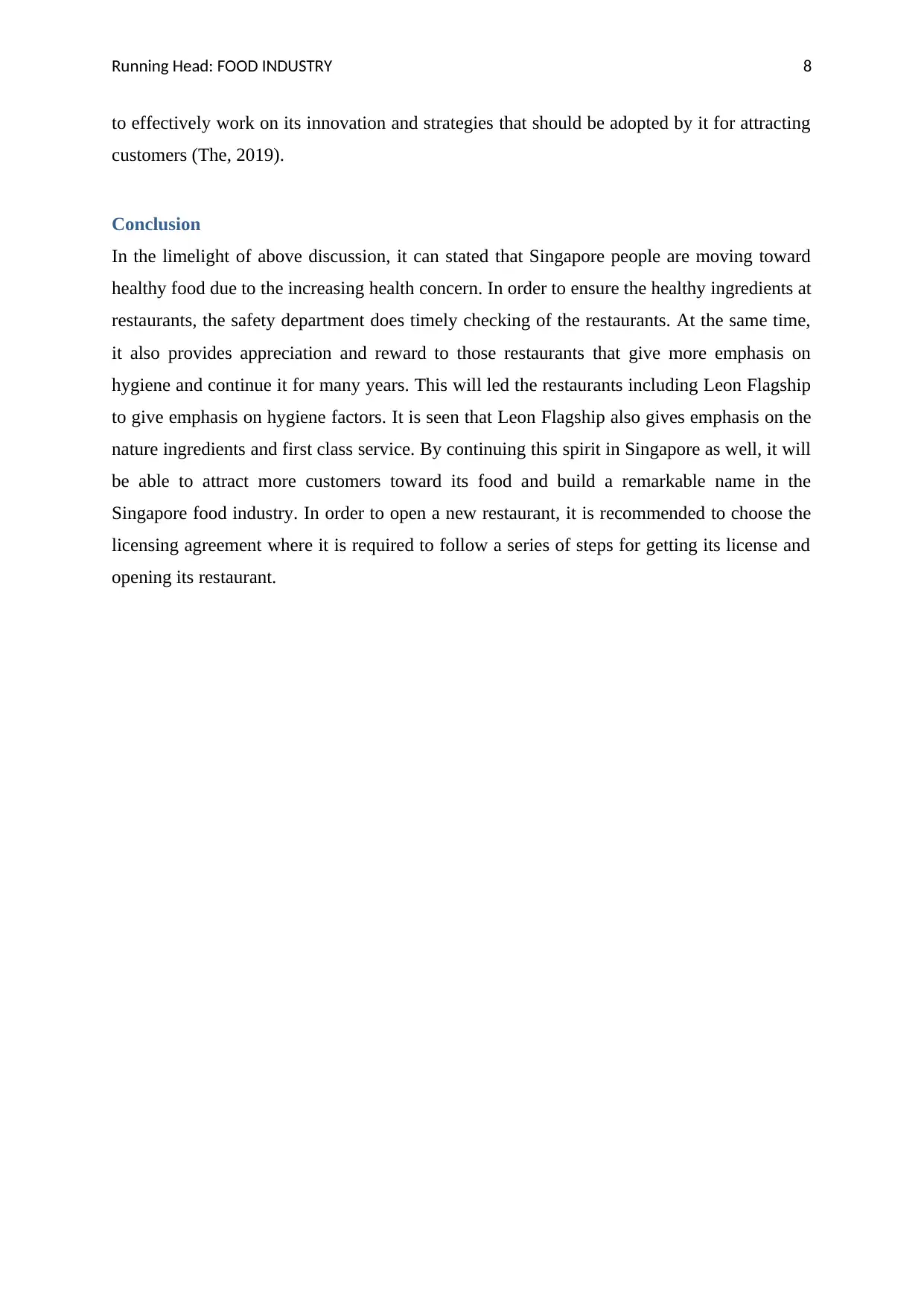
Running Head: FOOD INDUSTRY 8
to effectively work on its innovation and strategies that should be adopted by it for attracting
customers (The, 2019).
Conclusion
In the limelight of above discussion, it can stated that Singapore people are moving toward
healthy food due to the increasing health concern. In order to ensure the healthy ingredients at
restaurants, the safety department does timely checking of the restaurants. At the same time,
it also provides appreciation and reward to those restaurants that give more emphasis on
hygiene and continue it for many years. This will led the restaurants including Leon Flagship
to give emphasis on hygiene factors. It is seen that Leon Flagship also gives emphasis on the
nature ingredients and first class service. By continuing this spirit in Singapore as well, it will
be able to attract more customers toward its food and build a remarkable name in the
Singapore food industry. In order to open a new restaurant, it is recommended to choose the
licensing agreement where it is required to follow a series of steps for getting its license and
opening its restaurant.
to effectively work on its innovation and strategies that should be adopted by it for attracting
customers (The, 2019).
Conclusion
In the limelight of above discussion, it can stated that Singapore people are moving toward
healthy food due to the increasing health concern. In order to ensure the healthy ingredients at
restaurants, the safety department does timely checking of the restaurants. At the same time,
it also provides appreciation and reward to those restaurants that give more emphasis on
hygiene and continue it for many years. This will led the restaurants including Leon Flagship
to give emphasis on hygiene factors. It is seen that Leon Flagship also gives emphasis on the
nature ingredients and first class service. By continuing this spirit in Singapore as well, it will
be able to attract more customers toward its food and build a remarkable name in the
Singapore food industry. In order to open a new restaurant, it is recommended to choose the
licensing agreement where it is required to follow a series of steps for getting its license and
opening its restaurant.
⊘ This is a preview!⊘
Do you want full access?
Subscribe today to unlock all pages.

Trusted by 1+ million students worldwide
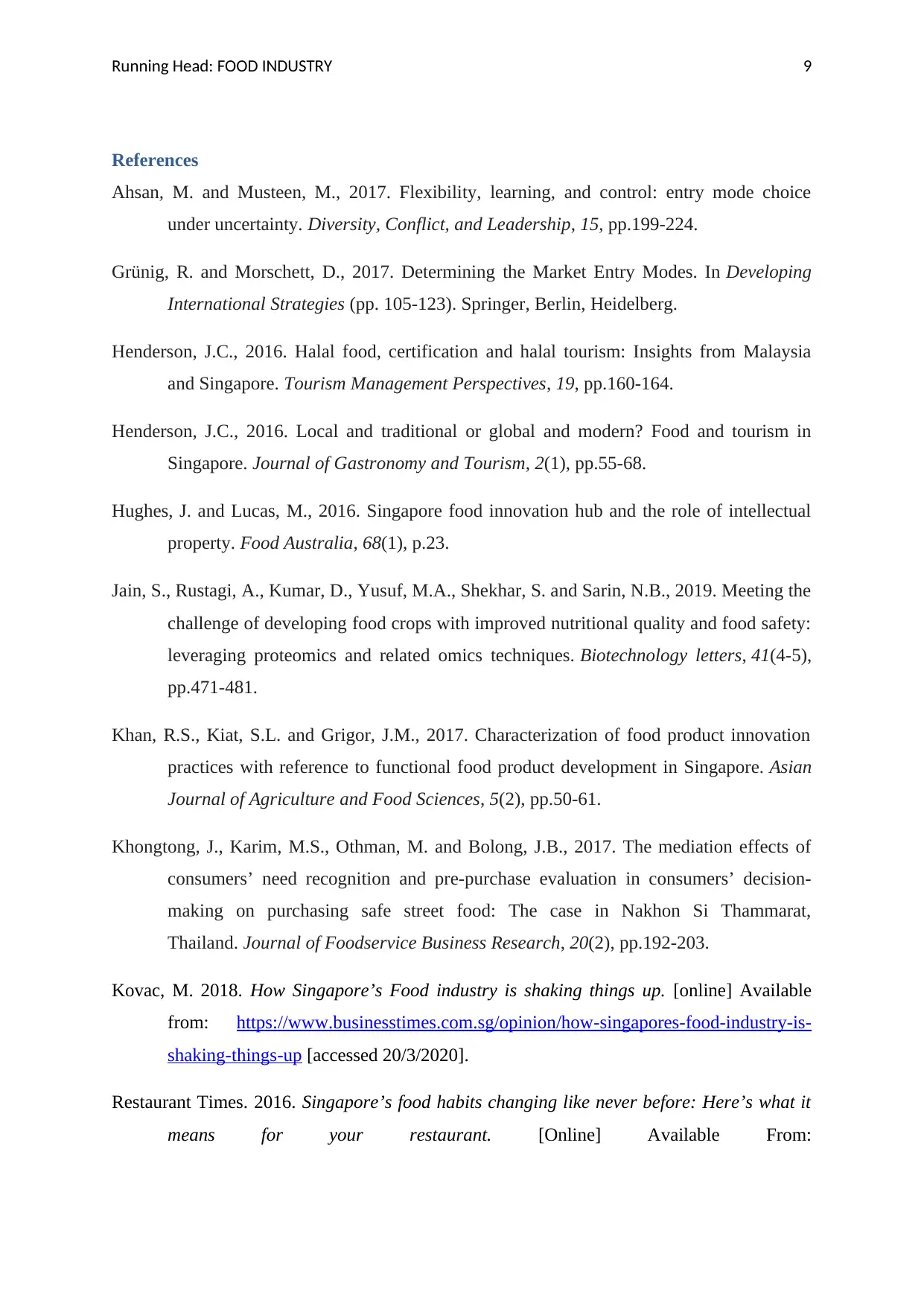
Running Head: FOOD INDUSTRY 9
References
Ahsan, M. and Musteen, M., 2017. Flexibility, learning, and control: entry mode choice
under uncertainty. Diversity, Conflict, and Leadership, 15, pp.199-224.
Grünig, R. and Morschett, D., 2017. Determining the Market Entry Modes. In Developing
International Strategies (pp. 105-123). Springer, Berlin, Heidelberg.
Henderson, J.C., 2016. Halal food, certification and halal tourism: Insights from Malaysia
and Singapore. Tourism Management Perspectives, 19, pp.160-164.
Henderson, J.C., 2016. Local and traditional or global and modern? Food and tourism in
Singapore. Journal of Gastronomy and Tourism, 2(1), pp.55-68.
Hughes, J. and Lucas, M., 2016. Singapore food innovation hub and the role of intellectual
property. Food Australia, 68(1), p.23.
Jain, S., Rustagi, A., Kumar, D., Yusuf, M.A., Shekhar, S. and Sarin, N.B., 2019. Meeting the
challenge of developing food crops with improved nutritional quality and food safety:
leveraging proteomics and related omics techniques. Biotechnology letters, 41(4-5),
pp.471-481.
Khan, R.S., Kiat, S.L. and Grigor, J.M., 2017. Characterization of food product innovation
practices with reference to functional food product development in Singapore. Asian
Journal of Agriculture and Food Sciences, 5(2), pp.50-61.
Khongtong, J., Karim, M.S., Othman, M. and Bolong, J.B., 2017. The mediation effects of
consumers’ need recognition and pre-purchase evaluation in consumers’ decision-
making on purchasing safe street food: The case in Nakhon Si Thammarat,
Thailand. Journal of Foodservice Business Research, 20(2), pp.192-203.
Kovac, M. 2018. How Singapore’s Food industry is shaking things up. [online] Available
from: https://www.businesstimes.com.sg/opinion/how-singapores-food-industry-is-
shaking-things-up [accessed 20/3/2020].
Restaurant Times. 2016. Singapore’s food habits changing like never before: Here’s what it
means for your restaurant. [Online] Available From:
References
Ahsan, M. and Musteen, M., 2017. Flexibility, learning, and control: entry mode choice
under uncertainty. Diversity, Conflict, and Leadership, 15, pp.199-224.
Grünig, R. and Morschett, D., 2017. Determining the Market Entry Modes. In Developing
International Strategies (pp. 105-123). Springer, Berlin, Heidelberg.
Henderson, J.C., 2016. Halal food, certification and halal tourism: Insights from Malaysia
and Singapore. Tourism Management Perspectives, 19, pp.160-164.
Henderson, J.C., 2016. Local and traditional or global and modern? Food and tourism in
Singapore. Journal of Gastronomy and Tourism, 2(1), pp.55-68.
Hughes, J. and Lucas, M., 2016. Singapore food innovation hub and the role of intellectual
property. Food Australia, 68(1), p.23.
Jain, S., Rustagi, A., Kumar, D., Yusuf, M.A., Shekhar, S. and Sarin, N.B., 2019. Meeting the
challenge of developing food crops with improved nutritional quality and food safety:
leveraging proteomics and related omics techniques. Biotechnology letters, 41(4-5),
pp.471-481.
Khan, R.S., Kiat, S.L. and Grigor, J.M., 2017. Characterization of food product innovation
practices with reference to functional food product development in Singapore. Asian
Journal of Agriculture and Food Sciences, 5(2), pp.50-61.
Khongtong, J., Karim, M.S., Othman, M. and Bolong, J.B., 2017. The mediation effects of
consumers’ need recognition and pre-purchase evaluation in consumers’ decision-
making on purchasing safe street food: The case in Nakhon Si Thammarat,
Thailand. Journal of Foodservice Business Research, 20(2), pp.192-203.
Kovac, M. 2018. How Singapore’s Food industry is shaking things up. [online] Available
from: https://www.businesstimes.com.sg/opinion/how-singapores-food-industry-is-
shaking-things-up [accessed 20/3/2020].
Restaurant Times. 2016. Singapore’s food habits changing like never before: Here’s what it
means for your restaurant. [Online] Available From:
Paraphrase This Document
Need a fresh take? Get an instant paraphrase of this document with our AI Paraphraser
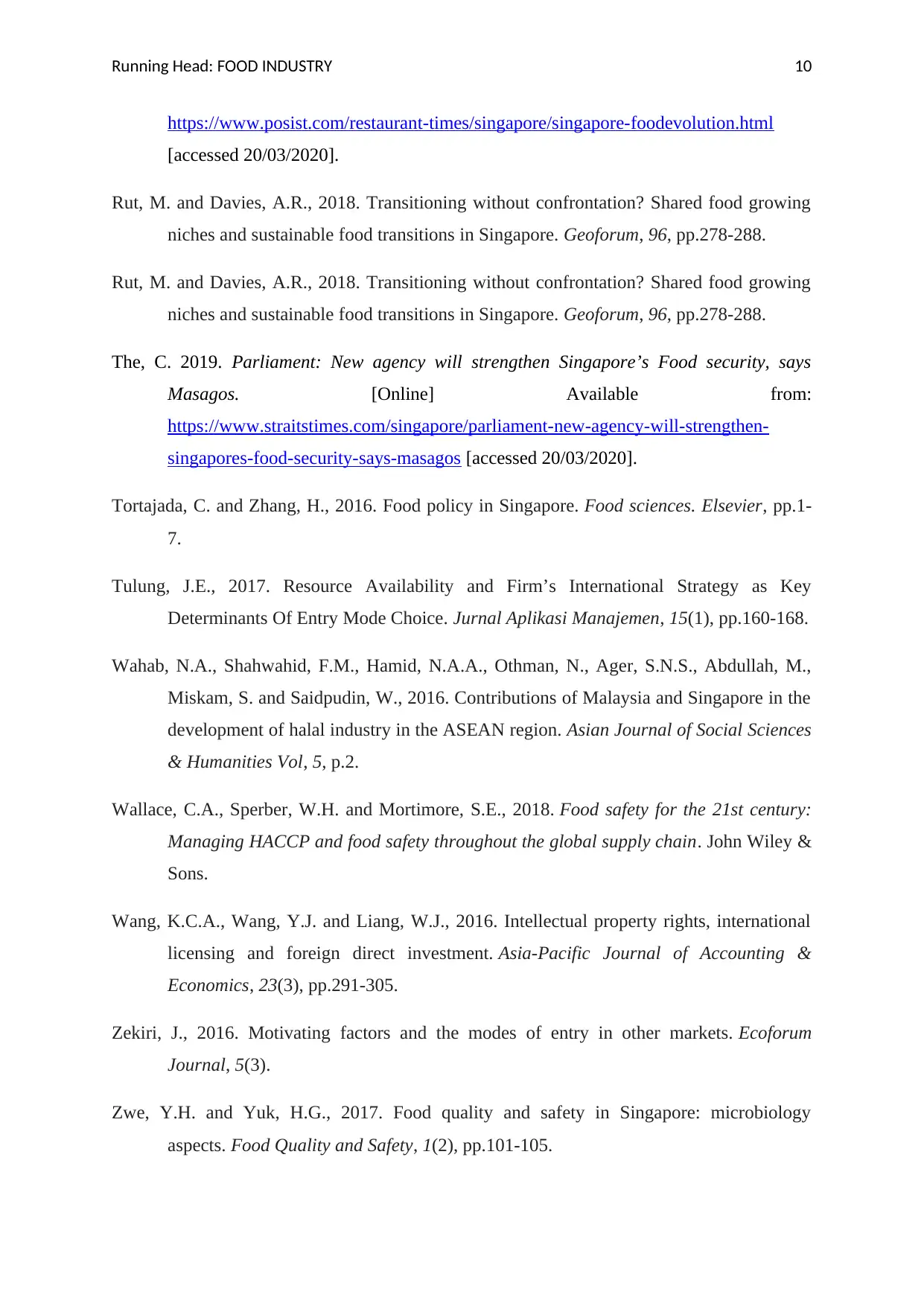
Running Head: FOOD INDUSTRY 10
https://www.posist.com/restaurant-times/singapore/singapore-foodevolution.html
[accessed 20/03/2020].
Rut, M. and Davies, A.R., 2018. Transitioning without confrontation? Shared food growing
niches and sustainable food transitions in Singapore. Geoforum, 96, pp.278-288.
Rut, M. and Davies, A.R., 2018. Transitioning without confrontation? Shared food growing
niches and sustainable food transitions in Singapore. Geoforum, 96, pp.278-288.
The, C. 2019. Parliament: New agency will strengthen Singapore’s Food security, says
Masagos. [Online] Available from:
https://www.straitstimes.com/singapore/parliament-new-agency-will-strengthen-
singapores-food-security-says-masagos [accessed 20/03/2020].
Tortajada, C. and Zhang, H., 2016. Food policy in Singapore. Food sciences. Elsevier, pp.1-
7.
Tulung, J.E., 2017. Resource Availability and Firm’s International Strategy as Key
Determinants Of Entry Mode Choice. Jurnal Aplikasi Manajemen, 15(1), pp.160-168.
Wahab, N.A., Shahwahid, F.M., Hamid, N.A.A., Othman, N., Ager, S.N.S., Abdullah, M.,
Miskam, S. and Saidpudin, W., 2016. Contributions of Malaysia and Singapore in the
development of halal industry in the ASEAN region. Asian Journal of Social Sciences
& Humanities Vol, 5, p.2.
Wallace, C.A., Sperber, W.H. and Mortimore, S.E., 2018. Food safety for the 21st century:
Managing HACCP and food safety throughout the global supply chain. John Wiley &
Sons.
Wang, K.C.A., Wang, Y.J. and Liang, W.J., 2016. Intellectual property rights, international
licensing and foreign direct investment. Asia-Pacific Journal of Accounting &
Economics, 23(3), pp.291-305.
Zekiri, J., 2016. Motivating factors and the modes of entry in other markets. Ecoforum
Journal, 5(3).
Zwe, Y.H. and Yuk, H.G., 2017. Food quality and safety in Singapore: microbiology
aspects. Food Quality and Safety, 1(2), pp.101-105.
https://www.posist.com/restaurant-times/singapore/singapore-foodevolution.html
[accessed 20/03/2020].
Rut, M. and Davies, A.R., 2018. Transitioning without confrontation? Shared food growing
niches and sustainable food transitions in Singapore. Geoforum, 96, pp.278-288.
Rut, M. and Davies, A.R., 2018. Transitioning without confrontation? Shared food growing
niches and sustainable food transitions in Singapore. Geoforum, 96, pp.278-288.
The, C. 2019. Parliament: New agency will strengthen Singapore’s Food security, says
Masagos. [Online] Available from:
https://www.straitstimes.com/singapore/parliament-new-agency-will-strengthen-
singapores-food-security-says-masagos [accessed 20/03/2020].
Tortajada, C. and Zhang, H., 2016. Food policy in Singapore. Food sciences. Elsevier, pp.1-
7.
Tulung, J.E., 2017. Resource Availability and Firm’s International Strategy as Key
Determinants Of Entry Mode Choice. Jurnal Aplikasi Manajemen, 15(1), pp.160-168.
Wahab, N.A., Shahwahid, F.M., Hamid, N.A.A., Othman, N., Ager, S.N.S., Abdullah, M.,
Miskam, S. and Saidpudin, W., 2016. Contributions of Malaysia and Singapore in the
development of halal industry in the ASEAN region. Asian Journal of Social Sciences
& Humanities Vol, 5, p.2.
Wallace, C.A., Sperber, W.H. and Mortimore, S.E., 2018. Food safety for the 21st century:
Managing HACCP and food safety throughout the global supply chain. John Wiley &
Sons.
Wang, K.C.A., Wang, Y.J. and Liang, W.J., 2016. Intellectual property rights, international
licensing and foreign direct investment. Asia-Pacific Journal of Accounting &
Economics, 23(3), pp.291-305.
Zekiri, J., 2016. Motivating factors and the modes of entry in other markets. Ecoforum
Journal, 5(3).
Zwe, Y.H. and Yuk, H.G., 2017. Food quality and safety in Singapore: microbiology
aspects. Food Quality and Safety, 1(2), pp.101-105.
1 out of 11
Related Documents
Your All-in-One AI-Powered Toolkit for Academic Success.
+13062052269
info@desklib.com
Available 24*7 on WhatsApp / Email
![[object Object]](/_next/static/media/star-bottom.7253800d.svg)
Unlock your academic potential
Copyright © 2020–2026 A2Z Services. All Rights Reserved. Developed and managed by ZUCOL.





